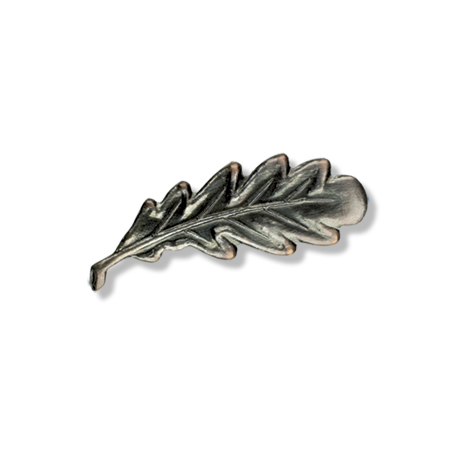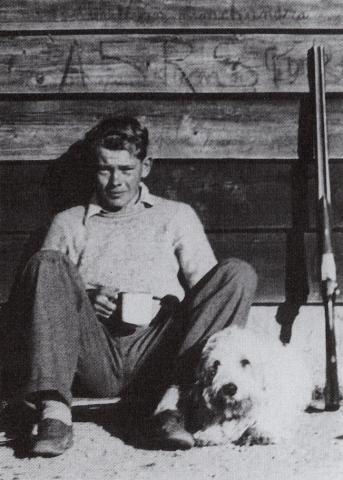Lieutenant Colonel James Owen Merion Roberts ('Jimmy') was the Commander of A Company, 153 Gurkha Parachute Battalion during Operation Puddle and the battle of Sangshak. He was also an accomplished mountaineer known for a number of his ascents.
Jimmy was born in India on September 21, 1916 as the only son of Henry Roberts, a headmaster in Gujarat state, and his wife Helen. He was sent to England for schooling, where he was educated at King's School Canterbury, and also attended the Royal Military College, Sandhurst. He returned to India to join the Army in 1936, explaining that it was "because I was unqualified for any more intellectual employment, but mainly because I wanted to climb in the Himalaya. Not just one expedition, but a whole lifetime of mountaineering and exploration. It worked". He is first listed in the unattached list for the Indian Army as a 2nd Lieutenant on August 27, 1936.
Jimmy served in India with the 1st Battalion, East Yorkshire Regiment in his first year in the army. Then on November 4, 1937 he joined the 1st Battalion of the 1st King George V's Own Gurkha Rifles (the Malaun Regiment). He was promoted to a full Lieutenant on November 27, 1938. Before the outbreak of the Second World War, he served in British India's North West Frontier Province (modern-day Pakistan). From 1940-1941 he was adjutant to the Regimental Centre in Dharmsala. Finally, when the opportunity presented itself to join the 153 Gurkha Parachute Battalion in October 1941, he became one of its first recruits.
The fledgling unit was given the chance to prove its airborne capabilities in Operation Puddle, which involved just seven Gurkhas and four Brits. This was a response to the invasion of Burma by Japan in December 1941. Little was known about the extent of Japanese penetration into the north of the country as a forested mountain range (the Hump) blocked intelligence gathering efforts from the Indian side. The Gurkhas were to fly over and drop from a Lockheed Lodestar over Myitkyina in Burma, to gather intelligence on airstrips and airfields and find out how far north the Japanese had progressed. After dropping, they had to march 150 miles to reach and reoccupy the recently abandoned Fort Hertz. Hertz was envisioned by the allies as a crucial staging post for aircraft flying along the route of the Hump (the supply line between India and China).
Reaching Dinjan airfield in Assam on June 24, the Gurkhas were delayed by bad weather for over a week; the monsoon season had already begun. They eventually took off at 1615 hours on July 3. Jimmy, who was now a temporary Captain, described the drop:
"We banked steadily and began to lose height. We saw the Ningchangyang paddy-fields - flooded - and smiled wanly at each other; we banked again; we were all standing up now; the red light went on; the wireless container was half-way through the door, with Roberts [the despatch sergeant] and the operator straining to hold in a roll of blankets which was trying to make a premature getaway; the green light went on; out went the wireless and I sprinted heavily towards the door. "Out you go, sir," shouted Roberts, and out I went over Burma. The parachute opened; I untwisted my rigging lines and looked about. I was making straight for a nice, soft, wet stretch of paddy; two water-buffaloes glared balefully up at me, rather suspiciously watching their first parachute jump. Their horns looked menacing. A moment later I sat down in a couple of feet of Burmese water. A boy working in the paddy a hundred yards away watched me land and then, unimpressed, returned to his work, I flapped my little Union Jack at him, though I didn't suppose he knew what it was, and called him over. The remaining three men of my "stick" had landed behind some trees; I could see no one and thought something had gone wrong and I was by myself. The plane came over on its second run and our seven containers came out; then over again with the remainder of the party; No. 7 landed noisily in water about thirty yards from me, and dived for cover.
The boy couldn't understand a word of what I said, but we eventually came to the understanding that there were no Japs in the area; he carried my parachute to a small hovel on the edge of the paddy-fields, and there the party collected, very wet but in high spirits. It was getting dark now and we split up to recover what containers we could. Eventually we gathered again with a total bag of the wireless and two containers; the rest would have to wait till morning. We lit a fire and dug out a little bully-beef and chocolate from our haversacks; the containers produced wireless batteries and pistol ammunition; heavy fare even for hungry men. But we were quite happy round our fire, drying our clothes and smoking. The men were coming in from the fields and we soon collected quite an audience in our little circle of firelight. Someone produced a couple of bottles of country spirit; so we had a party. All attempts at conversation in Hindustani failed and I began to realize that getting information in the Kachin Hills without an interpreter was going to be difficult. We wrapped ourselves in wet parachutes and tried to sleep. I don't think anyone succeeded; I certainly had about the worst night of my life, scratching flea-bites and swatting mosquitoes and was heartily glad when, at about 3 A.M, an early-minded cock crew and I could give up trying to sleep".
The next morning, Jimmy and the Gurkhas collected their containers and set up their wireless radio, conveying the message back to the airfield that they were safely down. Despite the language barrier, they made friends with the locals and spent the following night in a bamboo hut using parachutes as mosquito nets and wearing long trousers to protect from the parasites. Two Gurkha patrols were then sent out, but returned unsuccessful with the news that a ferry across the Mali Kha river was controlled by the Japanese. Moreover, the batteries on their radios had now run out, so they had to wait for a pre-arranged rescue flight by a Westland Lysander, which was supposed to arrive fifteen days after the drop. Failing to see the Lysander, Jimmy and his men finally departed for Fort Hertz on July 19.
The whole party was soon affected with malaria. As Jimmy noted, "the main thing was that they always managed to keep on staggering along". After seven days they reached Kajitu, where they were informed that a Bristol Blenheim had passed by the two previous days with a message for the paratroopers. They stayed a day at Kajitu but only encountered the Blenheim after leaving, exchanging a message with it via their T-panels and receiving the response that it would return with food. However, it did not return. Now they had to continue the trudge north, following the lines of the retreating Chinese Fifth Army. Along the way, they met with the dead and dying of their Chinese allies.
After the Blenheim encounter, contact was lost with the paratroopers in the remote jungles of Burma. Major Hopkinson from the 152 Battalion was sent on a flight over Fort Hertz on August 12 to see if he could find them. He was relieved to see that the Gurkhas had captured the Fort, although they were skeletal in appearance and in desperate need of food. Hopkinson refuelled and returned with food promptly. Luckily, another Operation known as Firepump, led by Captain G.E.C. Newland of the 153 Battalion, had already been planned to drain and repair the landing strip at Fort Hertz. As part of this Operation, more Gurkhas dropped on the Fort on August 13 and helped repair its walls. After marching for days through the jungle without food, three Gurkhas received the Indian Distinguished Service Medal for their efforts; their names were Narbahadur Thapa, Jabarjang Gurung and Ganga Bahadur Pun. Jimmy was awarded the Military Cross on September 29, 1942.
During the battle of Sangshak in March 1944, Jimmy was in charge of A Company, and led the final counterattack against the Japanese at the church on March 26. His Company was selected as the last to put in an attempt after three successive failures. As many of the paratroopers' grenades had faulty components, Jimmy borrowed some from the Mahratta Light Infantry, and led his Gurkhas towards the church. Through their initiative, they regained the defensive perimeter, saving the 50th Brigade precious time as it prepared to withdraw from Sangshak that evening. Jimmy was promoted to Captain on August 27, 1944. He was also part of the 50th Indian Parachute Brigade's only battalion-sized parachute drop in Operation Dracula, which took place near Rangoon in Burma on May 1, 1945.
After the war, he transferred to the 2nd Gurkhas in December 1947 and served as its second-in-command at its Regimental Centre in Dehra Dun. He joined their 1st Battalion in Singapore in June 1948, following the outbreak of the Malayan emergency. He continued to serve as second-in-command until October 1955, with a spell as their temporary CO from December 1951 to May 1, 1952. In recognition his efforts he was awarded a Mention in Despatches dated May 1st, 1953. He was also appointed an MBE on May 31, 1955.
Jimmy took a position as a Deputy Recruiting Officer at Lehra in the Punjab in October 1955. On October 10, 1958, he became the military attaché to Nepal based in its capital of Kathmandu. At the same time, he was made a temporary Lieutenant Colonel. He helped organise both the King of Nepal's visit to the UK in October 1960, for which he was awarded the Order of Gorkha Dakshina Bahu (3rd Class). He was also involved in the return trip of Elizabeth II to Nepal in February 1961, for which he was awarded an MVO and later an LVO.
Jimmy retired from the regular Army on May 20, 1962, receiving the honorary rank of Lieutenant Colonel. He was removed from the reserve of officers on September 21, 1966, having reached the age limit. In his later years, Jimmy ran a pheasant farm near a lake in Pokhara, Nepal. He never married, but had an adopted son called Bobby Gurung. He died in Pokhara on November 1, 1997, at the age of 81.
Compiled with information from:
Action Asia Obituary, https://web.archive.org/web/20060105133311/http://www.actionasia.com/actionasia/Articles/index.jsp?aid=816
Edward, Field Marshall Sir John and Edward, Jim. 1997. Lieutenant Colonel James Owne Merion Roberts. HIMALAYA 17(2). Available at: https:/ https://digitalcommons.macalester /digitalcommons.macalester.edu/himala .edu/himalaya/vol17/iss2/9 ol17/iss2/9
Obituary in the Independent, Wednesday 26 November 1997, https://www.independent.co.uk/news/obituaries/obituary-ltcol-james-roberts-1296352.html
India's Paratroopers, A History of the Parachute Regiment of India (London, 1975), K.C. Praval
Airborne Assault Archive
Article written by Alex Walker
Read More






Latest Comments
There are currently no comments for this content.
Add Comment
In order to add comments you must be registered with ParaData.
If you are currently a ParaData member please login.
If you are not currently a ParaData member but wish to get involved please register.